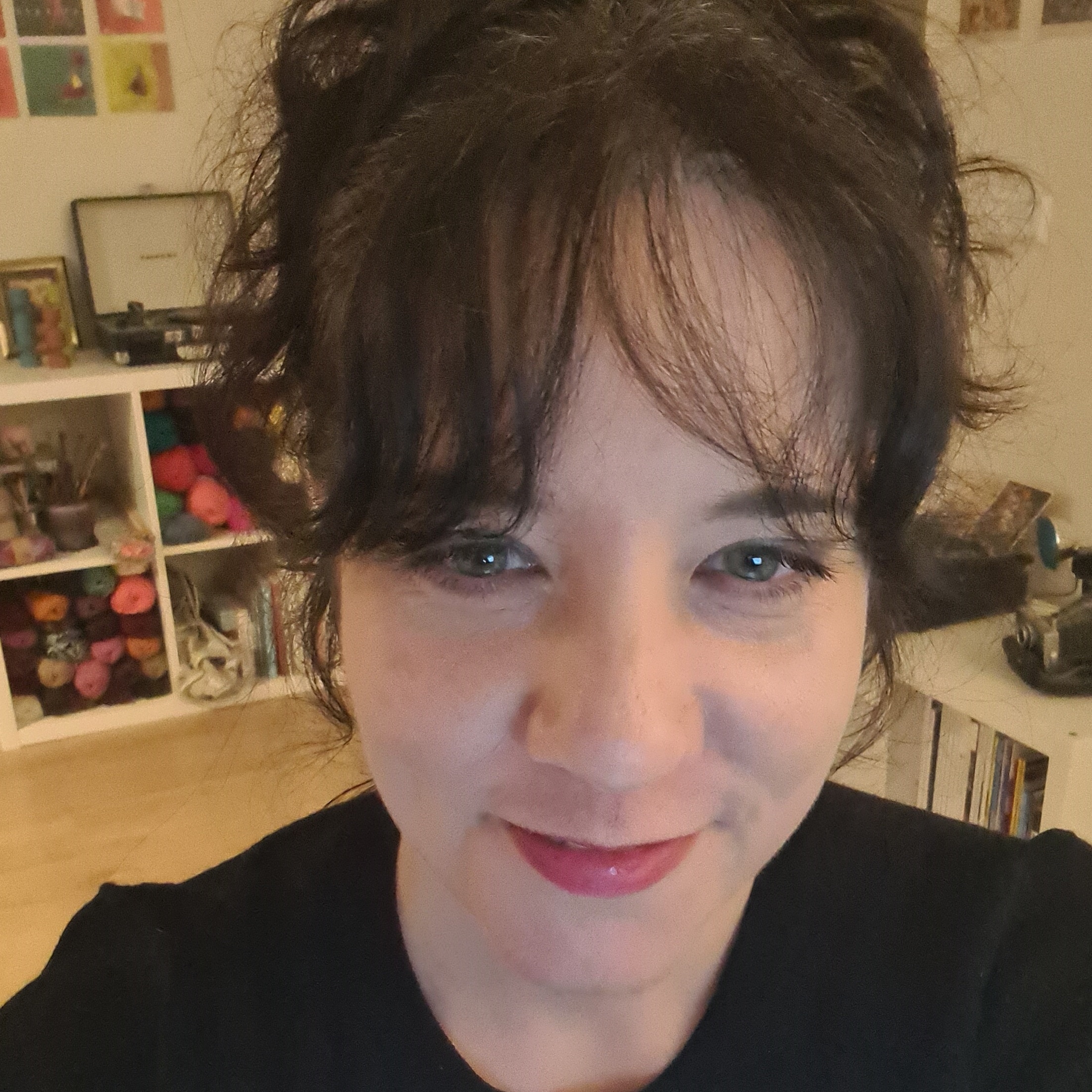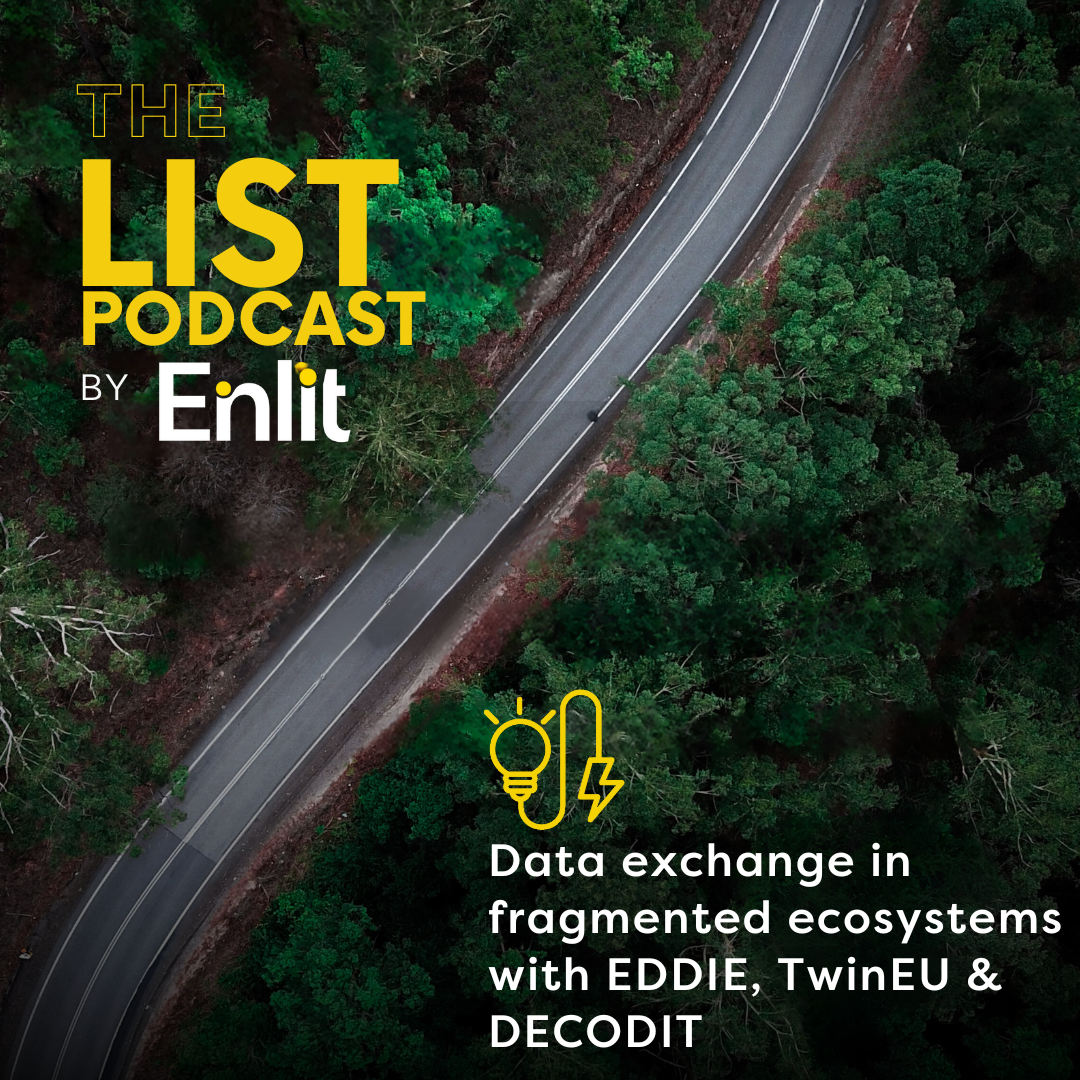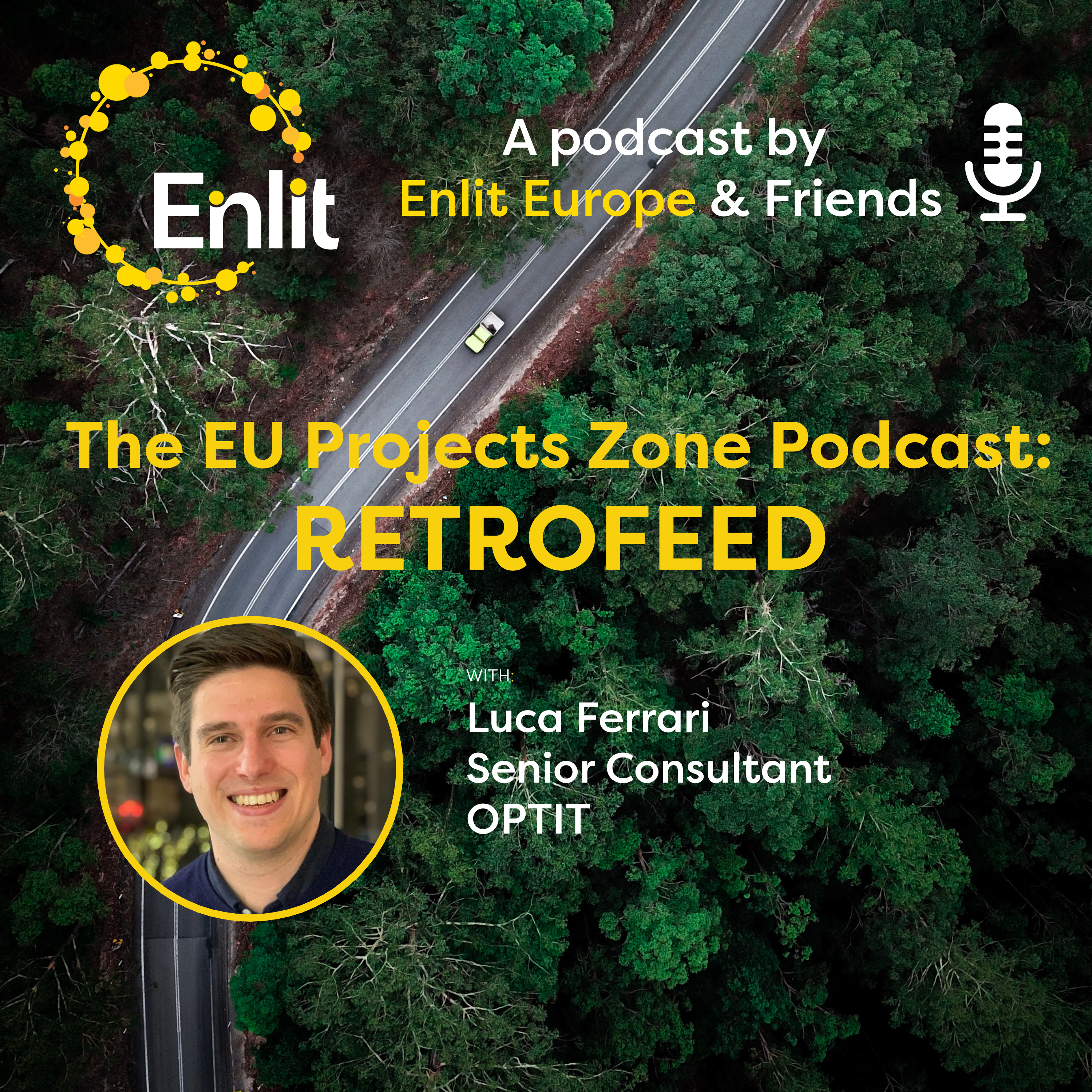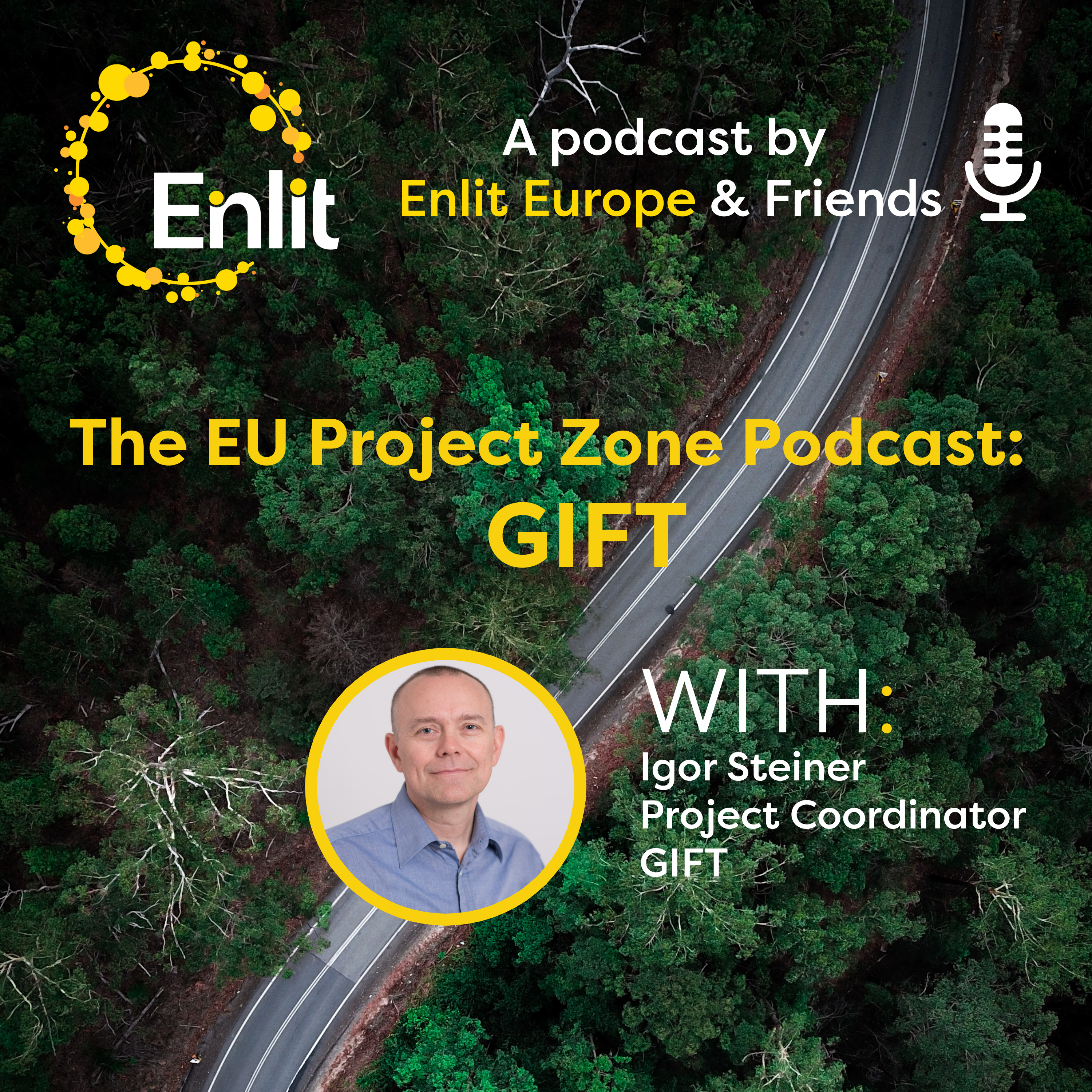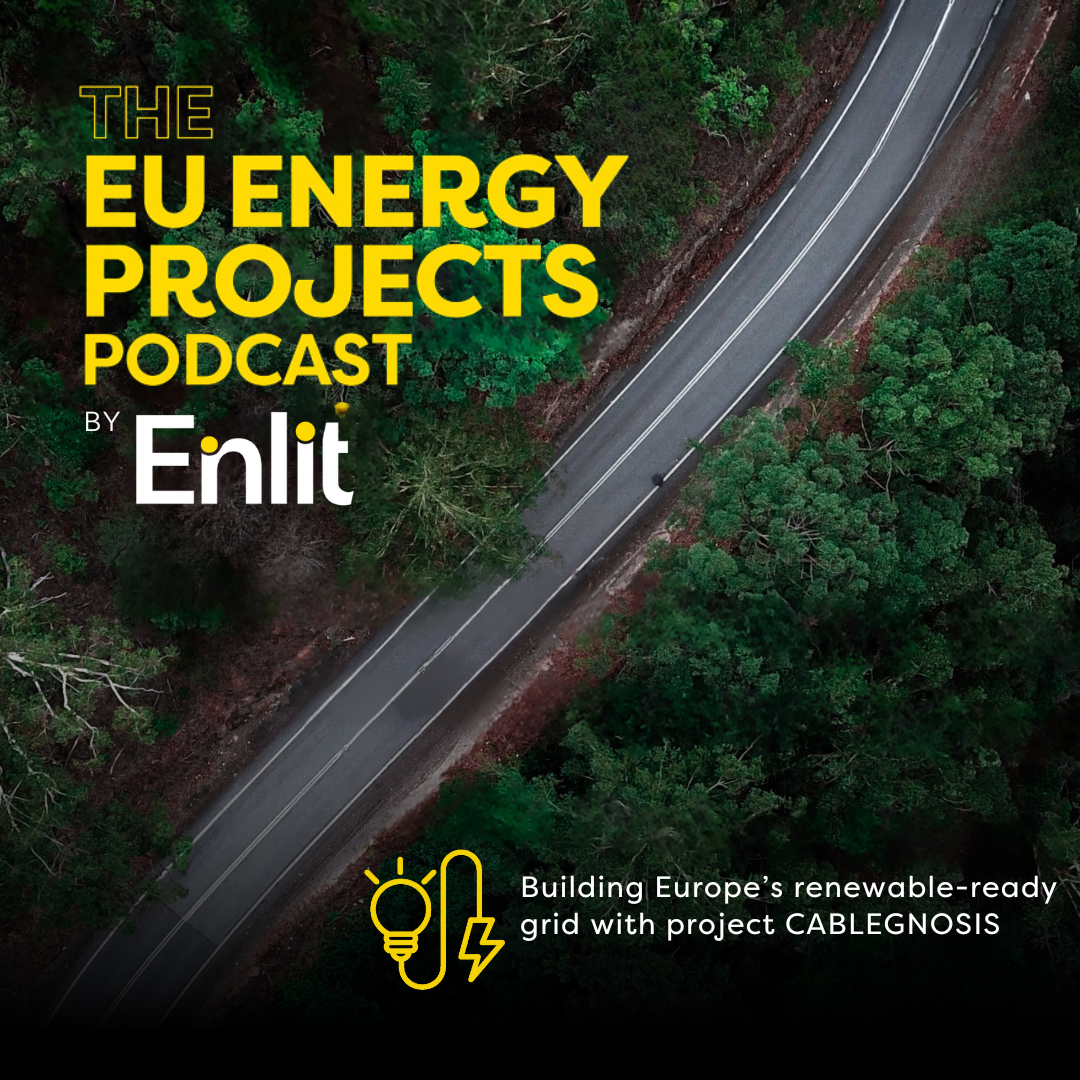Episode Transcript
[00:00:10] Speaker A: Welcome to the EU Energy Projects Podcast, a podcast series from ENLID and friends focusing on the clean energy transition for the European Union and the EU Commission funded energy projects that will help us achieve it. My name is Areti Daradimu, I am the editor of the EU Energy Projects podcast and your host.
This episode is a special edition and features a conversation between three EU funded projects grappling with the complexities of data exchange in fragmented isolated ecosystems. While coming from different domains, they face similar barriers as they aim to help end user citizens to trust and share data as they participate in the energy transition. The discussion features Laurent Schmidt, the use case coordinator of project, Eddy Stratiska Narajos, the project coordinator of the Decoded project and Ilias Zafiropoulos, the technical coordinator of the Twin EU project.
This episode was recorded in the media studio at ENLIT Europe in Milan, where energy projects were at the heart of the event.
[00:01:27] Speaker B: Hi, welcoming the EU Energy Project podcast. I'm Laurent Schmidt, the use case coordinator of EDI and I'm very happy to be today with colleagues talking about synergies between our European projects.
[00:01:39] Speaker C: Hi, I'm Ilya Zafiropoulos, I'm the technical coordinator of Twin EU Project. I'm very happy to participate in this discussion.
[00:01:46] Speaker D: Hi, Loren Elias. I'm Stradzka Narcos. I'm excited to be here with you. I'm the project coordinator of Decoded.
[00:01:53] Speaker B: Okay, so I propose to first discuss and introduce very briefly what each of our products are about.
[00:02:00] Speaker C: Our project Twin EU brings together a great number of partners across Europe and is targeting to develop and federated architecture of digital Twins that aims to facilitate to enable the system operation, the planning and also the cyber resilience of the panel European electricity grid.
[00:02:20] Speaker D: Well, Decoded is trying to help citizens, the end user, to overcome the challenges and barriers they are facing today with regards to the building energy renovation. So we are facing mainly two problems. All the solutions that are offered seem quite complex to an average citizen. So we don't know how to navigate this complex landscape. And the second one is, if you think about a building and its energy renovation, it involves around 100 different specializations. Each one of them works in a fragmented way, like a small island that tries to optimize its own context. So what we are trying to do is bring all of them together in one way, one method in order to help the citizen.
[00:03:06] Speaker B: Okay, so on our ED side I think we already had several podcasts. We are aiming for prototyping Pan European, a common Europe energy data space and focusing in particular on two use cases of flexibility, integration of flexibility into TSO and DSO grids, learning from a previous project like OneNet and moving one step further towards integrating data between consumers of different type, building homes, bidirectional charging of cars and really working on a data exchange framework which is enabling this. So we are mid of the project and we are now preparing for rolling out a real demonstration in various countries in Europe.
[00:03:53] Speaker D: It's great because I understand that our projects have certain similarities. We are all trying to deal with data exchange in a fragmented isolated ecosystem and we are all trying to overcome the main barriers towards it which is trust. So can we help end user citizens trust to share the data? And number two, how can we enable different systems coming from different domains, the energy or finance or let's say building renovation, to exchange data between each other? I'm very keen to hear your opinion Laurent.
[00:04:38] Speaker B: Yeah, we fully agree on that. We do have to learn from each other on the best idea to develop these reference architectures. Moving forward on data exchange, we've been trying to learn from the OneNet project on our side and expanding it further towards new data exchange for consumer. We've been working a lot recently on to reference data model and as well as basically the API layers and interoperability in particular to widen as much as possible data integration at the lowest cost, leveraging open source. So this is definitely something which is important to discuss between us.
[00:05:27] Speaker C: Yes, I fully agree with this. We also have the issues of data sharing among different architectures, different ontologies. But on top of that we also have in our project the issue of model sharing. So regarding connecting different digital twins that will be developed in different countries with different needs, with different challenges, we have to make them interoperable, we have to make them use one another, let's say the basic functionalities and support the overall development of pan European electricity grid digital twinning.
This is something we are target to do and we have already started working on the business use cases and the system use cases for the various applications on a pilot level. But also we are starting to develop ideas regarding the federated architecture of the digital twins.
[00:06:24] Speaker A: Did you know that Enlite has another podcast? The Energy Transitions Podcast is a broad ranging bi weekly podcast about the people accelerating the energy transition in Europe and beyond. You can find it on Spotify, Apple or wherever you enjoy your podcasts.
[00:06:45] Speaker D: That's a great thing. I mean we are just at the beginning of our project but what we have as our strategy, let's say we will put a lot of focus on, is Try to learn from what has been already developed and try to learn also from other projects that are currently more or less on their completion. One thing we have put a lot of emphasis as well on is on participation into Bridge and the different working groups in order, first, to maximize our learning from what has been achieved through European projects and other initiatives. And second, to be able to contribute as well to the Bridge and to other projects that will start or are starting right now.
[00:07:28] Speaker B: Yeah, very good to hear that. We are actually looking in the same direction on our side when we design our architecture. We look at the outcome of the DERA architecture 3.1, which already was bringing a lot of service catalogs, a lot of analysis, and we thought about Eddie actually adding services on the top of these ones with the view that we should not stay in our silo behind the meter. We, we really need to bridge these data up to the grid operator for running certain calculation as an example or building owner, as exactly you say to model building digital twins and so on. So this data integration seems good news align between us.
[00:08:15] Speaker C: Yes. There are also several events and several frameworks that we can exchange information about the progress of our projects. And it's also very important to know what is there in order not to reinvent the wheel all the time. At the same time, we will have to dedicate some effort in order to understand what is the landscape outside also the projects outside in the real market. And this is something that we target to do regarding the issues of what is considered as a digital twin. This is a big challenge for us to understand what is the digital twin and where we can position our project and our developments in order to serve the needs of the market and the grid operators.
[00:08:59] Speaker D: Yes. From our side, we understand that as a project it is not possible to change the landscape. This would be an unrealistic more or less target. So what we are trying to do is trying to converge where European Union is targeting right now. So there are two different aspects that we have taken into account. First, the European Code of Contact for interoperable home and smart energy devices is the first one. And our second target is the idea of the Common Energy European data space that will provide the framework for different projects, for different companies, for different organizations to like a LEGO system, integrate with each other in a seamless and frictionless way. So this is what we are trying.
[00:09:50] Speaker B: To do right now, Eddy. We have been trying to prototype the Common European Energy data space. So again, I think the Commission is doing great work into clustering these projects together and getting ourselves working into same objectives. What I see as well is there is a lot of layers which we are developing as open source layers actually. And I see more and more GitHub communities being created out of researchers, academics, but also industries, which is also going to lower the knowledge gap onto reusing this. I think that's also a very interesting initiative. I would also link to the new regulation which is coming and especially the new smart energy expert group with the data for Energy group, which is also aiming to take lessons learned, I think from projects like ours and discuss between stakeholders whether the direction is correct and the standards and interoperability are right.
So I think one of the key elements of our development is scalability moving forward and each of us trying to make use of building blocks which can grow at a pan European scale being reduced. And so that's what we are trying to do in edi. And so of course comes the question about whether we once will be competitors or we will stay friends through the next phase of deployments. And what we see as Eddy is we think there is a common layer between these data space which is to be created together and we hope we will be able to manage to keep a minimum of collaboration at this layer, at this core layer. Very happy to hear from your ideas on that.
[00:11:44] Speaker C: Yes, I fully agree with this. I believe that scalability is the next challenge, let's say the final challenge of our project. Most of the projects have dedicated a specific effort in order to demonstrate the scalability of the solutions. This is also something that we have in mind as well as the adaptability in order to serve different needs and also to be open source in the sense that we can, let's say, open to the world and further elaborations further developments regarding this federated architecture of digital twins in order to facilitate the wider implementation of this project results.
[00:12:23] Speaker D: Yes, I mean, that's a very interesting point which we second and let me just say in addition that how we position ourselves, so we position ourselves as a company, part of an ecosystem that tries to change the way business is being done until now. So we are not competitors, we are actually collaborating in order to deliver products and services that are much better than the existing ones. In that sense, what we want to achieve is the development of tools and services that are excelling. In order to do this, we think we need to have an approach where we develop common technological tools that are not more or less important in terms of competition. They are rather reducing the development cost and help us build and grow the ecosystem. And number two, understand what are the Key differences that will help us differentiate in order to develop the different tools and solutions for the different business domains.
[00:13:25] Speaker B: Yeah, we agree on this ecosystem approach that there will be competition in the ecosystem, but the common layer should remain as much as possible open and interoperable in a way.
Okay, so we talked about scalability. So now one key question is the long term impact on what we are doing and trying to step back from a bridge perspective. What, what is useful on what we are doing and maybe I'll start by giving a few ideas here. What we think is the tools which we developed through this project are essential to enable the next repower EU regulation, electricity market design, where we see basically data exchange interoperability being at the core of these new regulation.
And I think our projects are a very interesting example on how things will be achieved or can be achieved in the future. At least that's what we aim for.
[00:14:21] Speaker C: Yes, I agree with this and I would also like to point out that we are very much interested in supporting the EU action for grids. I think the grids will be, the electricity grid will be the main energy carrier of the future and we need to bridge, let's say the competencies and the developments of the cyber layer and the physical layer. So having more technologies deployed at the electricity network, together with software and interoperable IT solutions I think will be the key point for the future development of.
[00:14:56] Speaker D: The electricity grid as an innovation focused project. For us, in principle, innovation is not just the development of technologies. In the end, in the long term we have to change the way people behave. So for us, the long term impact will be on changing the way business is done in the energy domain, how we transform passive buildings to smart buildings that are interacting and part of the energy grid. So with this in mind, what we are aiming at is helping create, develop this ecosystem, which is not straightforward. There needs to be a range of solutions and services that more or less are helpful and impactful for the end user. So this is our long term impact, create this ecosystem with a diverse set of solutions.
[00:15:48] Speaker B: Okay, so we see the energy landscape changing pretty quickly. So I think each of us are introducing new concepts. So maybe I would like to say a few words on what we have seen evolving through the trajectory of Eddy. And one thing which is striking is this electrical car and electrical transportation integration into the power system. And with the joint integration of PV at the residential level, storage cars becoming bidirectional. And so I think one of the very strong use case which we develop on our side is really from the consumer being able to federate and coordinate the these distributed energy resources from the car into the home environment and then being able to flexibility trade it into a grid service or an energy community surrounding the home. So that these are some of these strong use cases which we see developing now in the context of the new electricity market design. But very happy to hear from you.
[00:16:51] Speaker C: It has been nearly one year. We started this January, our project and we are really very much excited about what we are developing in the sense that we are really covering several dimensions of the electricity grid, talking about different voltage levels from end consumer up to the transmission level and cross border exchanges. We are also targeting different operations, business operations, regarding planning, regarding system operation, regarding maintenance and asset management.
Also in this way we have different use cases that cover different challenges of system operators and also energy producers that are involved in the development and of course end consumers that at the edge of the grid will use electricity power. And another interesting issue that another interesting phenomena that we have in the project is that we are having different collaborations. We are trying to have use cases that people exchange their ideas and their models in order to develop things that can really cause different challenges and support different applications across Europe.
[00:18:09] Speaker D: It's exciting to see how many things you have achieved already in your projects and also how many new targets are being more or less developed while the project is moving on. Definitely it's a landscape that is constantly changing and we need to be there. We need to be doing research and innovation in order to answer all these questions that arise. And we certainly believe as well it will be a very interesting era, the one concerning AI and AI act and how this will impact the smart energy landscape. So thank God we have ENLIT to bring us together in order to discuss and have such interesting discussions. Discussions.
[00:18:47] Speaker B: Thank you colleagues for this very encouraging discussion. Thank you for attending our podcast today. Goodbye.
[00:18:57] Speaker A: You've been listening to the EU Energy Projects Podcast, a podcast brought to you by ENLIT and friends. You can find us on Spotify, Apple and the ENLIT World website. Just hit subscribe and you can access our other episodes too. I'm already Daradimu. Thank you for joining us.
